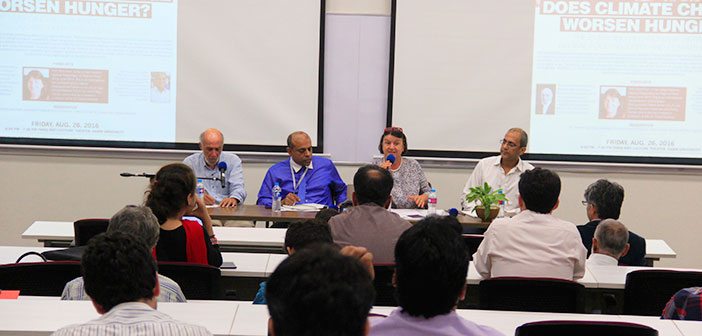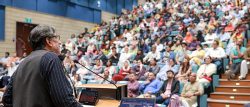IDRAC Panel Discussion addresses issues of food security and climate change
The experience of hunger is one that is reiterated by around 50% of the population of Pakistan, which is a horrifying figure in itself, but add to this the fact that the issue of climate change is never linked or studied in connection to malnutrition is leading to harrowing results. Both the themes of hunger and climate change were addressed at length through the IDRAC center at Habib University, previously known as the Yohsin Center for Social Development, on August 26th, 2016.
The Interdisciplinary Development Research and Action Center (IDRAC), was designed to delve into issues of social change and development, and this being the first panel discussion of the summer, was made up of renowned names in the industry. Professor Hilal Elver, the UN Special Rapporteur on Right to Food was present, along with Professor Richard Falk, the director of Climate Change, Human Security and Democracy Project at the Orfalea Center, UCSB. Along with Professors Elver and Falk, Mr. Haris Gazdar was also present, who is a founding member of the Collective for Social Science Research, with the panel being moderated by Habib University faculty member Dr. Muhammad Haris.
Diving into the dynamics of malnutrition in underdeveloped countries, Professor Elver introduced the audience to the issues of climate change and hunger. “While many countries suffer from malnutrition, hunger, lack of food security and climate change, all these issues are never looked at together. Even while climate change negotiations happen, the issue of food security is not raised”, she said. “In order to solve these issues, they need to be looked at together. For instance, corn and maize and similar crops are utilized for the production of biofuel in order to reduce the amount of carbon dioxide in the air. However, this solution to climate change affects food security adversely, since nearly 40% of corn in the US is used for the production of bio-fuel”.
The issue of climate change affecting agricultural activities is not a new one, as the low yield of agriculture is known to cause high concentration in carbon dioxide, leading to change in the quality of food. However, underdeveloped countries are taught not to question the quality of food they are being fed, regardless of consequences. “Even climate smart agriculture is focused on increasing production based activities, as that benefits corporations more than the people going hungry. However, we produce more than enough”, she said.
Professor Falk commented on the politics of corporations in terms of bridging the gap between climate change and hunger. “There is incentive both to the private and public sectors of private economy to leave the issue as is. Corporations must realize that deferring problems to the future will only aggravate the nature of the challenge, making it into a beast of a problem that is difficult to manage”. Mr. Gazdar reiterated this point, commenting on how important it is to promote local food initiatives and ecosystem oriented agro-ecology initiatives on a global scale. “We have always heard, while growing up, that at the least, people don’t go to sleep hungry in Pakistan”, he said, “…Well, it’s a lie.”




